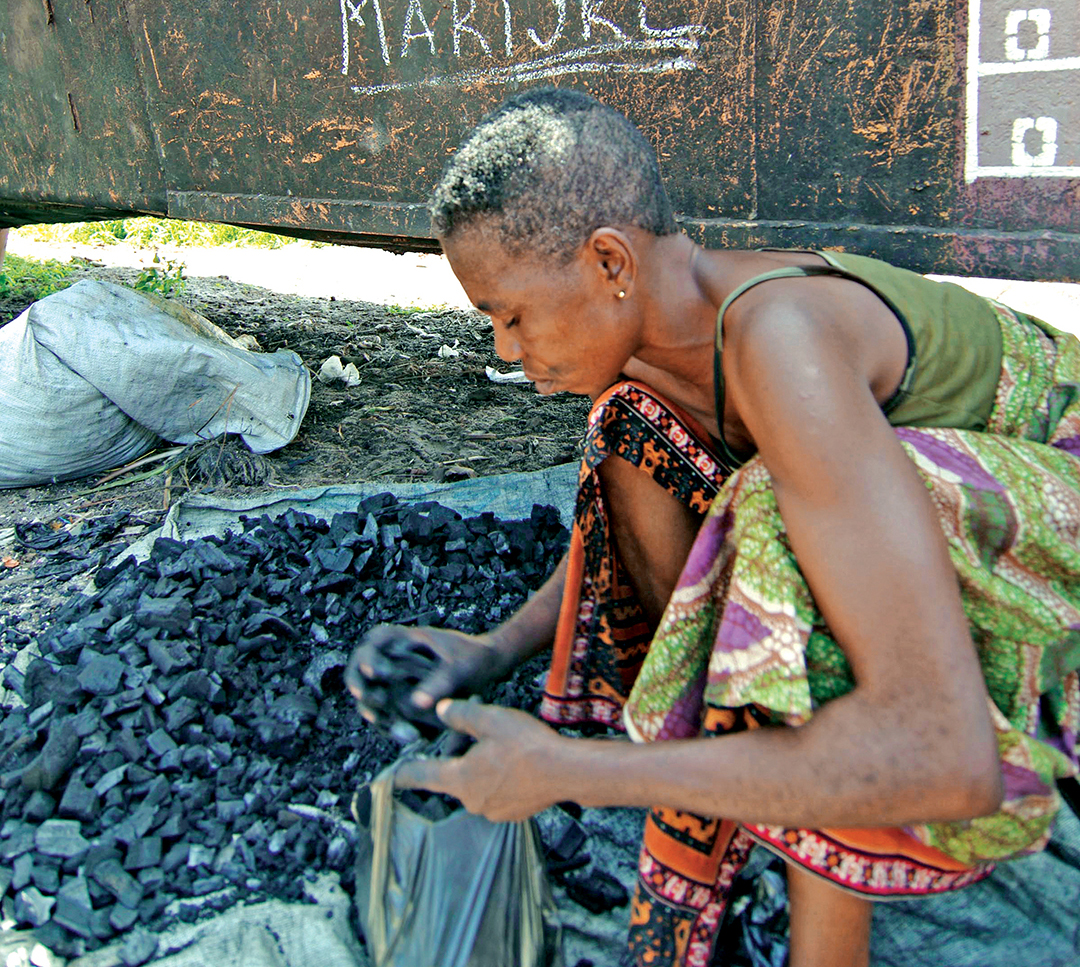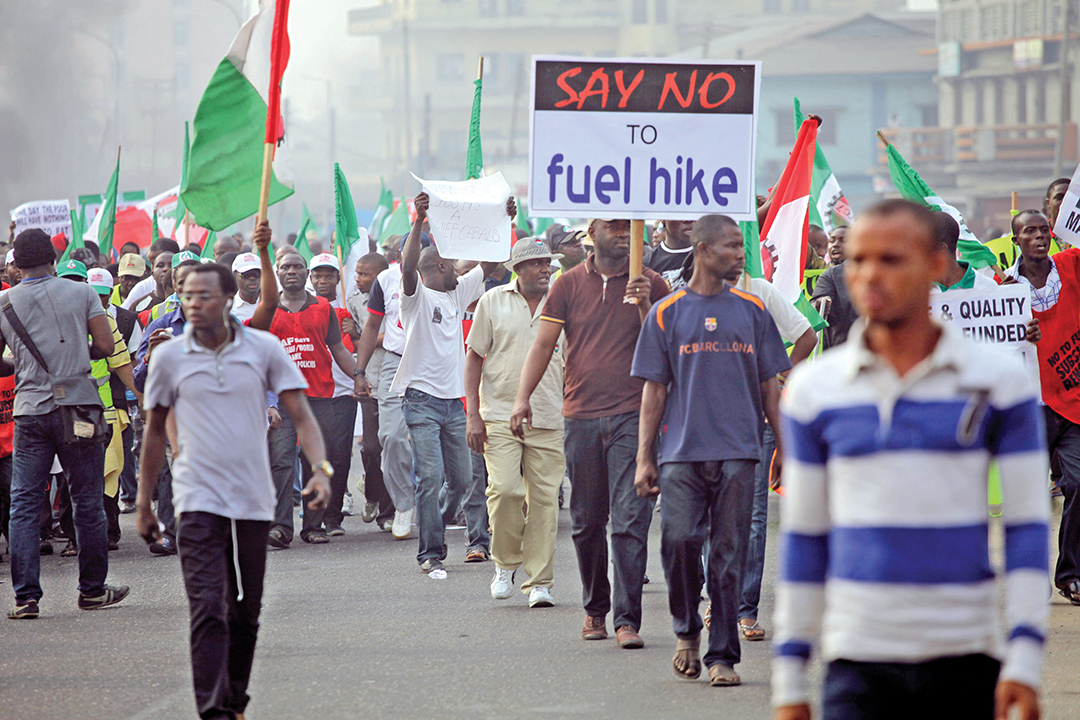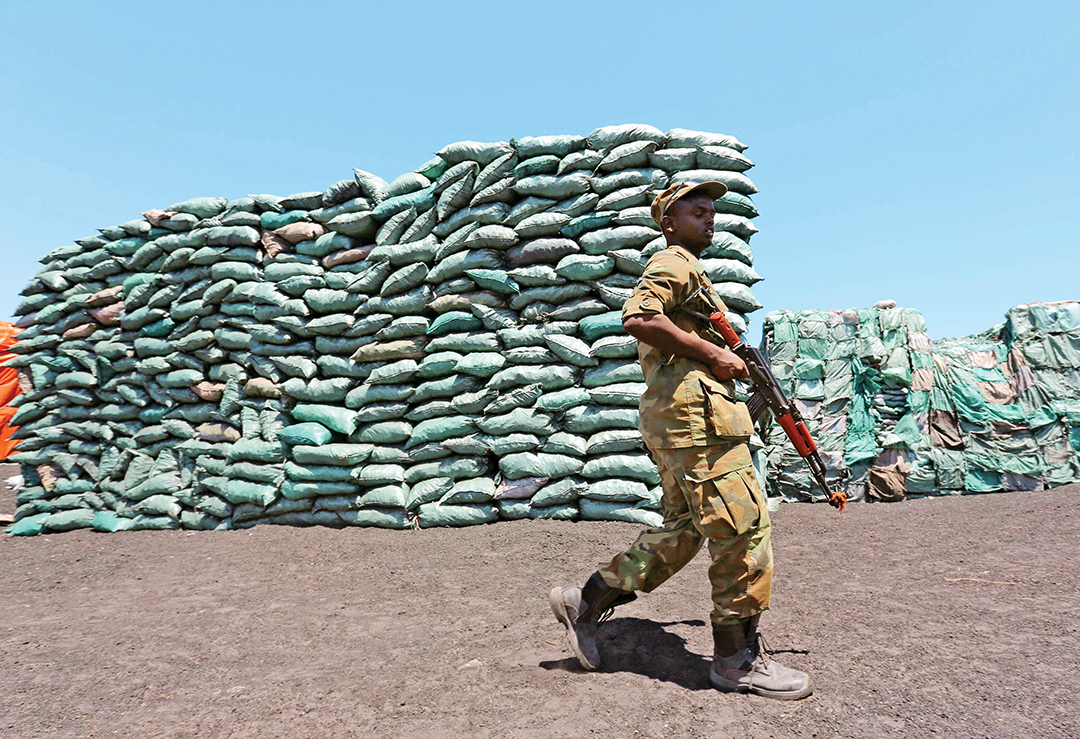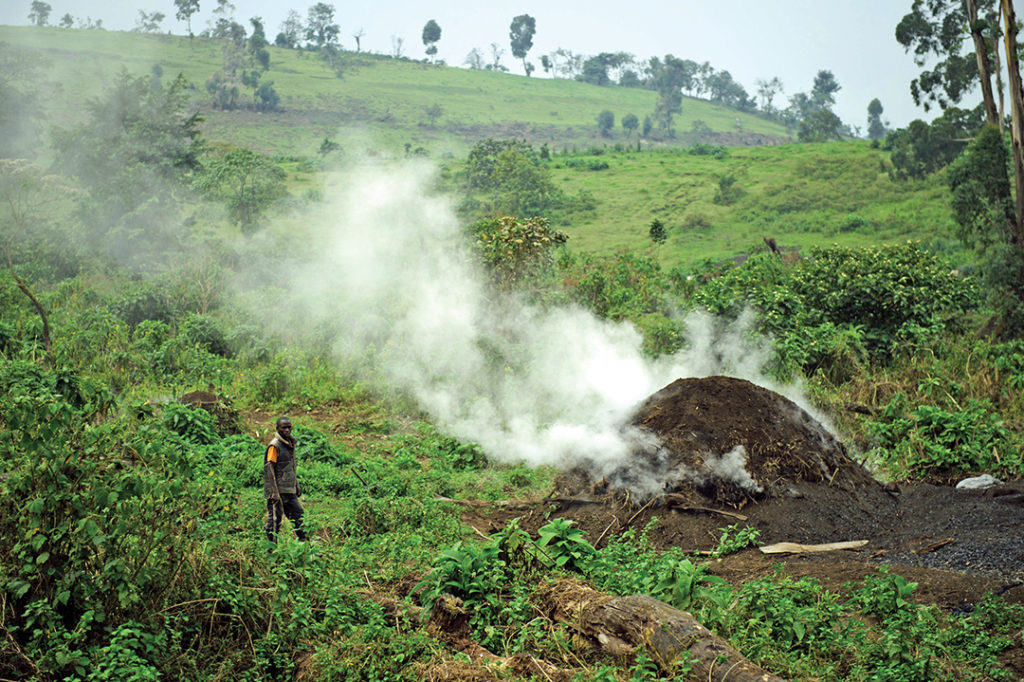Competition for energy resources often leads to violence. Africa hopes it can meet growing demands while reducing conflict.
ADF STAFF
By 2030, the global demand for energy is forecast to increase by 44 percent. Much of this new demand will come from emerging markets, including Sub-Saharan Africa. Millions of new air conditioners, smartphones, refrigerators and other items will push the continent’s electrical grid to its limits. Additionally, a growing manufacturing sector and increased automobile traffic will drive demand for coal, oil and natural gas.
Although science has made major strides in diversifying energy sources and moving away from a complete reliance on hydrocarbons, the world’s energy supply remains finite. Renewable sources make up less than 1 percent of the world’s energy and are not expected to rise above 5 percent by 2030. Meeting the growing demand will be difficult.

Historically, competition over limited resources such as energy has led to violence. Sudan and South Sudan warred over oil rights, militias in the Niger Delta fight for a share of oil extraction profits, and the terror group ISIS strategically occupies oil fields to finance its agenda. Given this, it is incumbent upon security professionals to understand the ways these conflicts can ignite between individuals, communities and nations. This understanding could lead to innovative strategies on how to stop them.
The charcoal industry
In much of the developing world, light does not come from flipping a switch, and heat does not come from a gas line. According to the World Bank, only 24 percent of the population of Sub-Saharan Africa has access to electricity. Worldwide, an estimated 2.5 billion people rely on biomass such as charcoal, wood, straw and manure for cooking and heating. Although this is mostly done by collecting wood and cutting down small trees, it can be broadened to an industrial scale, causing conflict and environmental degradation.
Nowhere is this more apparent than in the eastern Democratic Republic of the Congo (DRC). In this violence-plagued region, most people collect dry wood to meet their household needs or buy bundles of charcoal from small-scale vendors. Much of this wood comes from Virunga National Park, a lush rain forest that is home to some of the world’s last surviving mountain gorillas and is listed as a UNESCO World Heritage site. Three million people live within a day’s walk of the park, and most rely on charcoal for cooking and heating, according to a 2008 study by the International Institute for Sustainable Development (IISD).
Armed groups also profit from the trade. Numerous militias including the Forces démocratiques pour la libération du Rwanda (FDLR), a band of Hutu extremists whose members took part in the 1994 genocide in neighboring Rwanda, control the charcoal trade in a large sector of the park. Selling fuel, known locally as makala, has become a $30 million-per-year industry in the region, and the FDLR uses it to finance its activities.
By 2009, the situation had reached a breaking point with park rangers killed almost weekly, precious forest land going up in smoke, and militia groups engaged in deadly turf battles. The FDLR emerged as the most powerful force. It ran the operation like a mafia syndicate and controlled a network of loggers, charcoal burners and transporters. “The FDLR consider the forest as belonging to them. … They have subdivided it into tracts of about 5 kilometers, which three or four FDLR combatants monitor [day and night] when [the FDLR] are not fighting,” said Salomon, a trader who spoke to IRIN in 2009. The charcoal trade in Virunga implicated not just militias, but powerful businessmen, corrupt public officials and Soldiers as well. Institutional weakness allowed it to thrive, and the constant flow of refugees who were made homeless by conflict provided a growing customer base, according to a report by the IISD.
The situation has improved slightly since that time, and park rangers and Soldiers now stop trucks at checkpoints and confiscate charcoal shipments that are not accompanied by an official certificate of origin given by the DRC Department of Environment.
The charcoal-conflict phenomenon is not unique to the DRC. In Somalia, where tree cover is sparse and wood is extremely valuable, the terror group al-Shabaab funded its attacks by exporting huge amounts of charcoal to the Middle East. The group systematically stripped the land of 100-year-old acacia trees and exported charcoal across the Red Sea. In return, the group bought arms and sugar, which it smuggled into Kenya for sale.

“The charcoal trade for al-Shabaab is like the poppy trade for the Taliban,” UN Dispatch reported in 2012. “It is the single most important source of income.”
In all cases, the illegal charcoal trade thrives in the absence of state institutions and with the connivance of corrupt officials. Strengthening the rule of law in these regions and weeding out corruption are the two keys to ending this crime.
Sharing the wealth
One of the most common grievances that propels conflict is a group believing it is not getting its fair share of resources. When a group lives in an area with bountiful energy reserves, but does not see a share of the profit, anger tends to grow. In a groundbreaking 2014 study in the Journal of Conflict Resolution, academics Victor Asal, Michael Findley, James Piazza and James Igoe Walsh found that oil wealth serves as a unifying factor for rebel groups and a source of income to fund insurgent campaigns. They found that people living in areas of oil wealth who feel excluded from national politics are more likely to take up arms than are groups who simply feel excluded but do not live in oil-rich regions.
The rebel group Movement for the Emancipation of the Niger Delta (MEND) is a prime example. Since 2004, the group, from the oil-rich region of Nigeria, has used the oil issue as a recruitment tool and gained revenue through illegal bunkering. It has long argued that the delta region remains among the poorest in the country, and its people live in environmentally despoiled conditions while Nigerian elites and multinational companies get rich.
It is estimated that since the country’s independence in 1960, $300 billion to $400 billion in oil revenue has been stolen or misspent in Nigeria. That figure is nearly equivalent to the total amount of Western aid money the country has received in that same time. “There should be no inevitability in the relationship between oil, corruption, and violent conflict,” Nigerian scholar Cyril Obi wrote. “The reality is that oil alone does not lead to violence or corruption. Conflict occurs only as a result of the politicization of the oil factor, in ways that make the exclusive control of oil and its distribution the exclusive preserve of ‘a few’ to the exclusion of others.”
Keeping the MEND example in mind, countries are beginning to understand that if energy reserves are to be a blessing instead of a curse, the profits must be shared. A country hoping to lead the way in this effort is tiny São Tomé and Príncipe, 300 kilometers off the coast of West Africa in the Gulf of Guinea.
Oil was discovered off São Tomé’s shores in the late 1990s, and in 2004 the country created a National Oil Account that ensures a large portion of oil revenue is spent on public projects to reduce poverty and diversify the economy. The country also created a Permanent Reserve Fund to put money away for future generations. Although oil production has not begun and the country has faced setbacks, including bribery scandals and a coup, the government has added $60 million to its coffers and believes it has laid the groundwork for what could be as much as $20 billion total, equivalent to hundreds of times its current gross national product. “Although the country continues to face an array of challenges, these policies have generated much-needed government revenue, helped diversify the economy, lowered inflation and rates of poverty, and minimized corruption and the exploitation often associated with oil exploration and production,” wrote Benjamin Sovacool in a 2016 article for the journal Environmental Science & Policy.
Price shocks and blackouts
Energy can lead to conflict in other ways. When oil suddenly becomes scarce or unaffordable, it changes people’s lives. Commerce grinds to a halt, and families must immediately adjust their finances. It also can lead people to take to the streets in protest. In 2012, the Nigerian government lifted oil subsidies in an attempt to reduce its deficit. Overnight, the price of fuel at gas stations doubled from 45 cents per liter to about 90 cents. The shock brought thousands of protesters into the street who marched, burned tires and clashed with police. They argued that cheap oil was one of the few benefits they got from the state, and they rejected giving money back to a government they viewed as rife with corruption. At the end of more than a week of demonstrations, 16 people had died. Similarly, rolling electrical blackouts and what are perceived to be unfair electric prices have been a regular source of frustration in South Africa and have spawned protests.

It’s not just citizens who have been the victim of energy fluctuations. In 2015, the price of crude oil dropped to an 11-year low of $36 per barrel. This has been a major hit to the coffers of numerous nations that depend heavily on oil revenue. Angola, one of Africa’s booming economies that relies on oil for 95 percent of its revenue, announced in October 2015 that it was cutting spending by more than half. This move affects everything from infrastructure projects to trash pickup. In fact, a reduction in waste removal services was blamed for a yellow fever outbreak in the capital city, Luanda, in 2016.
Solutions
There is no way to completely decouple energy from conflict, and African nations will experience bumps in the road as they seek to meet growing demand. However, there are certain things that can help make the transition smoother.
Energy diversity
Countries that get energy from a variety of sources are less vulnerable to price shocks and less beholden to foreign sources. Ethiopia has led the way on the African continent in embracing renewable energy by using wind, solar, geothermal and hydroelectric power. In 2016, Morocco inaugurated the Noor 1 Ouarzazate solar thermal plant, which is one of the largest in the world and will eventually bring power to 1 million people.
Expanded grid
Africa still has the lowest rate of access to electricity on the planet, which is why so many people are forced to rely on charcoal and other energy sources that are tied to conflict. Expanding access to electricity will boost economies and put the violence-plagued charcoal industry out of business. One effort to make this happen is the U.S.-funded Power Africa Initiative launched by President Barack Obama in 2013. It seeks to double access to electricity in Sub-Saharan Africa, adding 30,000 megawatts and 60 million new connections.
Improved infrastructure
One of the biggest drains on fuel consumption is outdated and congested roads. For instance, due to congestion, a truck traveling from Lagos, Nigeria, to neighboring Benin could be on the road for 24 hours or more, in what should be only a three-hour trip. Railways can help lighten this load. A railway connecting the port in Djibouti to Ethiopia’s capital, Addis Ababa, is reducing travel time from two days to 10 hours and will take thousands of trucks off the roads in the coming years.
Seeing the benefits
The most effective way to prevent energy-related violence is to make sure that local populations benefit from energy profits. There is much work to be done to make this a reality. The World Bank estimates that in Nigeria, 80 percent of oil energy revenues benefit 1 percent of the population. Nigerian President Muhammadu Buhari has made cleaning up the oil industry a central objective of his administration and even named himself minister of petroleum.

